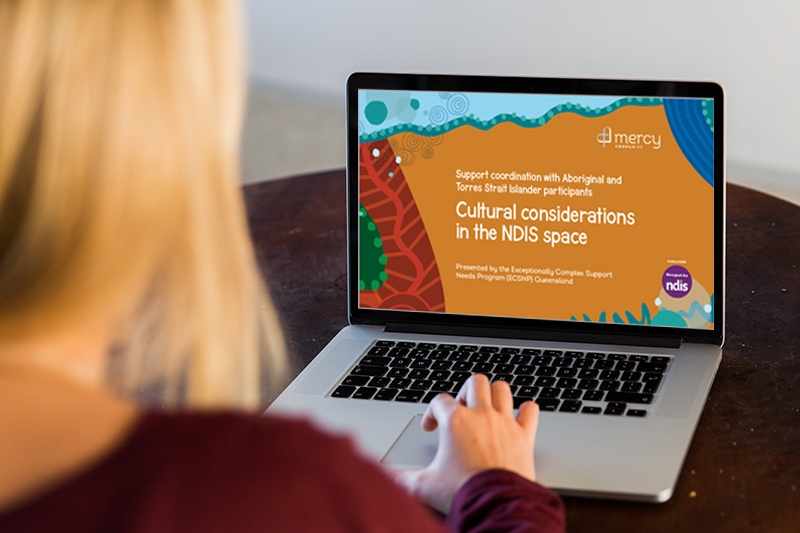
When you attract over 400 attendees to a webinar, you know you’re doing something right.
Mercy Community is the Exceptionally Complex Support Needs program provider for Queensland and the Northern Territory, funded by the NDIA, and this is just one example of the great response the program is receiving.
What is the ECSNP?
The Exceptionally Complex Support Needs Program is an industry-facing program that assists support coordinators, specialist support coordinators and professionals within the disability and NDIS sector to get together to share information.
It was established in late 2019 with a clear goal: to support and grow sector capability by ensuring that participants with exceptionally complex support needs are provided with professional, evidence-based support that can stabilise support requirements and promote independence.
“I’m part of this unique program that is funded and developed by the NDIA,” said Teanna Savvy, ECSNP & Complex Needs Support Coordinator with Mercy Community. “What we do in the program is provide education and knowledge exchange opportunities for support coordinators and professionals in the sector. It’s all about education and knowledge-sharing, to build people’s capacity to work with complex participants.”
How does it work?
“We have three functions,” says Teanna. “One is sector and community development, so that’s where lots of our workshops come from … [around mid-2020] we put a survey out to all our support coordinators, and we received around 127 responses. From that survey, people identified key areas where they wanted more education or more knowledge, so we chose six key themes and they became our first six webinars.”
The team are now running webinars almost every two weeks, with events lined up months in advance.
What has been the response?
In December 2020, the ECSNP collaborated with national disability services and held a positive behavior support web event which attracted over 400 attendees.
“We ended up doing a second one for Under 18s Positive Behaviour Supports and Restrictive Practice, and there were around 300 attendees at that,” says Teanna.
“One of our recent webinars was The Dignity of Risk. During this event, the whole topic opened up. We had set questions and we thought an hour and a half would be enough time but what kept coming up was ‘Oh I didn’t think of that’ … We had a director from the NDIA, we had a senior social worker from Queensland Health, we had a principal lawyer from disability legal services, we had a manager of a boutique service provider organisation and we had a support coordinator, so we were trying to get as many perspectives as possible to really have those big discussions.”
“It was really good. Many people especially appreciated the disability lawyer’s perspective; with all the knowledge and experience she brought to the discussion, you could just sit there and listen to her for days.”
“We had a really great mix of panelists and a really engaged audience, which makes a big difference to the quality of discussion,” said Teanna. “It’s a topic that people are really interested in.”
Feedback from attendees
Comments on the ECSNP Dignity and Risk webinar:
This is the first ECSNP Webinar I have attended, and it exceeded my expectations. I was nervous about attending however the way that it was structed was excellent and allowed someone like myself to listen in. By doing this in future I’d be more eager to engage however I liked that the panellists who had relevant experience really led it. It was great to hear different perspectives on same situations and challenged my thinking which I really enjoyed (Anonymous)
This was really helpful today as it was a case study so to speak and this format, I find more pertinent to our roles. if we could have this format for future session that would be really helpful. It was helpful to have different views from the different speakers as well. Thank you. (Anonymous)
Feedback from chat in Teams during webinar:
- I feel very touched by this session, it truly opened a window to reflect about our practice, working with people with such vulnerabilities and limited choices.
- Excellent subject and discussions—thanks to the panelists for a great webinar
- Thanks to all the panel—would love to see more of these types of opportunities for discussion.
- Thank you—it was great to hear so many perspectives on things we commonly deal with (smile)
- I love how you have real discussions
“I think something else that is really unique about our webinars is that we don’t come across as the experts and we don’t sit there and tell you how to do something … we want to have discussions, we want to have those conversations and we want to have scenarios that people can relate to and be able to say ‘Oh yeah I see why you did that’. We ask our panelists questions that relate to scenarios and look at how this actually works on the ground, as opposed to ‘I’m going to tell you how to do it’.”
A more focussed discussion
“We also do case review sessions as part of the ECSNP,” said Teanna, “which are more relaxed web discussions where we invite support coordinators to come and talk about complex cases that they’re having difficulty with, and that they would like feedback and peer support for. We’re doing those monthly.”
“We’re now doing a web event every week to every fortnight. We’re always doing something.”
“The reason people are passionate about the role of support coordination and about this system is that you’re always learning,” says Teanna.
Subject matter expertise
While the team don’t claim to be experts, another function the ECSPN provides is the facility to phone up and discuss a situation in detail.
“We have a business hours number for that,” says Teanna. “Support coordinators, professionals from the sector, mainstream services—they can call us and just workshop something individually.”
“If someone calls and says they’re in Cairns, I can say ‘Yes, we have a team there with knowledge of the localised supports and connections in the area, so let me get them to call you back.”
“There’s something about support coordination where you have to be able to think outside the box with a lot of things. I think that’s something we do really well in our team.”
If you’d like to get in touch with the Exceptionally Complex Support Needs team, call (07) 5490 8051.
Email: ECSNProgram@mercycommunity.org.au
Or visit the ECSNP Eventbrite page for upcoming events



